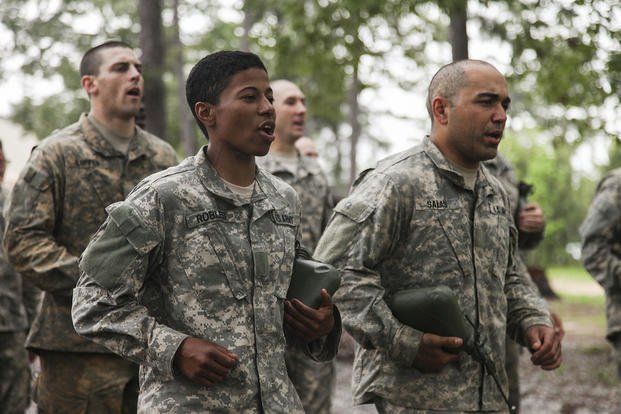Athletes from many backgrounds consider military service every year. Most come into their preparation journey with a wide variety of strengths and weaknesses. However, most will only determine their weaknesses if they honestly assess themselves by testing the skills required for their future profession.
Here is a question from a highly qualified person who needs just a little time to focus on some specifics of training.
Hi Stew, I'm 24 years old with a college degree and interested in joining the military, particularly the 75th Ranger Regiment or Army SF. So far, I've passively tried to train for it alongside my amateur Mixed Martial Arts (MMA) training. I'm on the mats 5-7 days a week. I'm 6'1", 188 pounds and my recent APFT numbers are 65 push-ups, 70 sit-ups, 12 pull-ups, and 14:36 for a 2-mile run. My recent 1RM lifts are: 385 deadlift, 325 back squat, 235 bench, 150 overhead press, and 60 pounds added weighted pull-up. I'm giving myself a year or so to properly prepare. Could you recommend any training focus? Thanks, Saul.
Saul, you are already a solid candidate. In another year, you can be an exceptional candidate with a capacity to qualify for whatever you put your mind to. I have several pieces of advice to consider, but these are largely going to focus on preparing for specific events in your future, versus addressing any real weaknesses in any of the elements of fitness (strength, power, speed, agility, run/ruck endurance, muscle stamina, grip, mobility and flexibility).
Here is my list for you:
1. Rucking
Progress your running miles so you increase your running volume about 10%-15% each week if no pain occurs. Add a ruck that's 20%-25% of your body weight to make the running miles on a leg day into a rucking workout. See the Fundamentals of Rucking article and learn the three paces that you will need to know to pace and strategize longer rucks. If you are going into the Army, you need to learn how to walk fast while carrying weight. You can start with a weight vest, but that should evolve into a backpack. Build up to 50-75 pounds over time.
2. Toughness
Given your athletic history, you are already physically and mentally tough enough. Adding more activities to your already busy training schedule will come at a cost, and you may not be able to adequately recover each week.
You may have to pull back on some of your MMA training. When you get six months out from joining or shipping to Basic Combat Training (BCT) in the Army, stop the MMA training altogether. The chances of injury are great in any combative and contact sport, and any injury can delay or disqualify you from military service.
I also give this advice to competitive triathletes, as I have seen many wreck or get hit by cars on road bike training days. Remember there is a fine line between mental toughness and stupidity. Any activity that can injure and delay or disqualify you is potentially on the stupid side of that line.
3. Periodization Training
Given your time and current abilities, I would consider a Seasonal Tactical Fitness Periodization approach and mix in specific training such as the Army Physical Fitness Test (APFT), Army Combat Fitness Test (ACFT) and rucking events to your cycles. One cycle can be a focus on calisthenics and cardio, and the next can be a cycle of lifting, running and rucking to improve in many of the required military events you will see in the future.
Overall, you do not have any real weaknesses. You can improve your running and calisthenics scores a bit. Adding rucking will be important this year. Other than that, focus on ACFT events during your training time, and you will be solid.
-- Stew Smith is a former Navy SEAL and fitness author certified as a Strength and Conditioning Specialist (CSCS) with the National Strength and Conditioning Association. Visit his Fitness eBook store if you're looking to start a workout program to create a healthy lifestyle. Send your fitness questions to stew@stewsmith.com.
Want to Learn More About Military Life?
Whether you're thinking of joining the military, looking for fitness and basic training tips, or keeping up with military life and benefits, Military.com has you covered. Subscribe to Military.com to have military news, updates and resources delivered directly to your inbox.


















